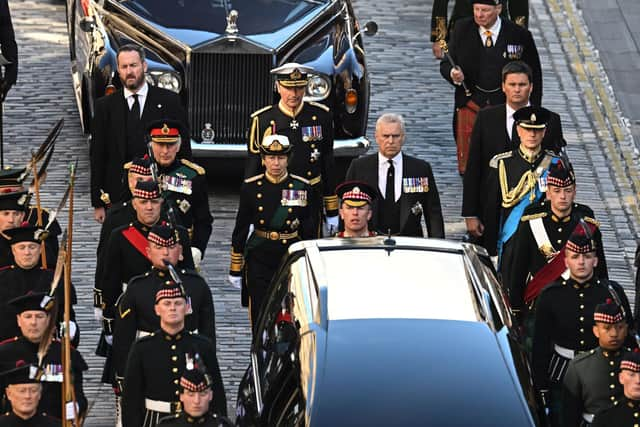Queen Elizabeth II: In 21st century Britain, it's not right to arrest people who protest against the monarchy – Laura Waddell
I, coincidentally, was already dressed in black, attending the funeral of a distant family member, the phone in my handbag blowing up with speculation as the Queen’s children and grandchildren journeyed to Balmoral. What has happened since has been a blur of ceremony, blanket news coverage, and mixed expressions of sympathy.
Among the tributes, whether sincere or obsequious and corporate, there have been people in attendance at significant sites or along the ceremonial route simply to witness a moment of history; to one day be able to say “I was there”.
Advertisement
Hide AdAdvertisement
Hide AdAnd, as one would expect in a democracy, there have been protests. Some protesters held signs with republican messages, others left their signs blank to make a point about fear of repercussions for speaking out against the monarchy. Some shouted slogans. Some have been arrested.
There are those who take umbrage with protest during a funerial procession: underneath all the ceremony, a family is grieving, they say. A woman who reminded many of their own grandmother, with her soft white perm and pearls, has slipped away.
Others who were there, standing beside protestors, probably wished to pay their respects in peace. There are few chances in life for the ordinary person to get a glimpse of the royal family with their own eyes, far less at a moment of historical significance, and in Scotland.
But this is no ordinary family, no ordinary funeral procession. When, for example, Prince Andrew walked down the cordoned off Royal Mile, it was more about his relationship with the British public, and his role in British society, than the private relationship he has with his departed mother.


The official events in Edinburgh this week were a ceremonial demonstration of the power differential between monarchy and subjects. If non-monarchists have this week extended some grace to those who feel saddened by the passing of the Queen, there too should be acceptance of those who wish to protest the political, regal, and economic way of things in Britain as ultimately symbolised by the head of state. Neither reaction is wrong.
Historic institutions able to raise a drawbridge to keep the public out are not above reproach, not even – perhaps especially not – if they are held up as role models of civility and decorum, the family face of the British state. It is not the job of the police to defend their honour with an overzealous response to protest.
By now, approaching a week since the death was announced, retail websites quietly reinstate sales promotions, news stories not about the royals are subtly breaking through the wall, and when the black banners come down completely, the space they occupied will once again document a Britain at breaking point – splitting along class lines and income disparity, essential services in crisis, cost-of-living and energy bill crises spiking out of control.
In recent months, as living conditions continue to decline in Britain, with the coming winter looking particularly bleak, some have asked why Brits do not protest as often as those in France when unhappy with governance. However, in Britain, in 2022, citizens protesting the monarchy have been first tutted, then arrested.
Comments
Want to join the conversation? Please or to comment on this article.

